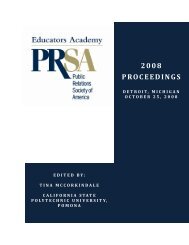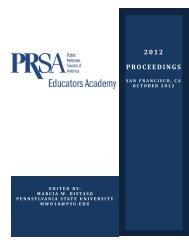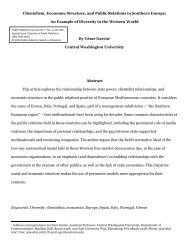2010 - Public Relations Society of America
2010 - Public Relations Society of America
2010 - Public Relations Society of America
You also want an ePaper? Increase the reach of your titles
YUMPU automatically turns print PDFs into web optimized ePapers that Google loves.
Trends evident in K-12 education, the impact <strong>of</strong> digital technology on writing skills, and<br />
financial pressures in higher education all suggest that regardless <strong>of</strong> institution type, more and<br />
more underprepared students will be turning up at the university gates. Tougher standards, on<br />
their own, may only result in smaller programs filled with students who still need help with basic<br />
writing skills. Based on the results <strong>of</strong> this study, a more balanced approach between rigor and<br />
remediation is advised.<br />
Reviewing RQ4, it is evident that faculty believe their programs have achieved no more<br />
than a moderate amount <strong>of</strong> success with any measures listed in the survey. The highest mean<br />
rating <strong>of</strong> 3.22 ( language skills exam with a basic class for low scorers) is hardly encouraging,<br />
and the cluster <strong>of</strong> mean scores near 3.0 (“neutral) for all items illustrates faculty members’ mixed<br />
feelings toward any measures they have tried. The fact that nearly two-thirds <strong>of</strong> the open-ended<br />
responses for this item indicated failure rather than success is further cause for concern among<br />
program planners. It is notable that the top two measures utilized – a basic writing class for all<br />
students and minimum GPA – garnered the lowest mean scores in terms <strong>of</strong> perceived success.<br />
Results relevant to RQ5 highlight a major finding <strong>of</strong> this study. All respondents,<br />
regardless <strong>of</strong> academic unit, Carnegie classification, or ACEJMC accreditation gave students<br />
similar ratings in writing pr<strong>of</strong>iciency. All respondents also indicated they are dealing with many<br />
similar writing-related issues and trying many <strong>of</strong> the same measures with mixed success. Given<br />
that all respondents appear to be fighting similar instructional battles with similar results, future<br />
studies might explore the best combinations <strong>of</strong> measures that could be pursued to everyone’s best<br />
advantage.<br />
On a more optimistic note, faculty in ACEJMC-accredited programs noted lack <strong>of</strong> quality<br />
work in student media as less <strong>of</strong> an issue than their counterparts in unaccredited programs. This<br />
might be explained by Standard 2: Curriculum and Instruction in ACEJMC’s accrediting<br />
standards. This standard states, “Students may take up to three semester courses (or their<br />
equivalent) at a media outlet owned and operated by the institution where full-time faculty are in<br />
charge and where the primary function <strong>of</strong> the media outlet is to instruct students.” ACEJMC<br />
adds, “The Council urges journalism and mass communications programs to advise students to<br />
acquire appropriately supervised experience in campus media and pr<strong>of</strong>essional internships.” In<br />
other words, careful supervision <strong>of</strong> campus media by full-time faculty, as required by ACEJMC,<br />
appears to improve the quality <strong>of</strong> work in student media.<br />
Trends in Open-Ended Responses<br />
Among the 97 respondents who answered the open-ended question on measures they<br />
would like to see their academic unit use, by far the largest number (32%, n = 31) indicated they<br />
would like to implement a language skills exam, either with a minimum grade required for<br />
program entrance or with a basic class required for low-scoring students. “I think it is effective in<br />
not only assessing student writing skill, but in getting students to realize our expectations in<br />
those areas,” wrote one respondent. Four respondents wrote that they would like to expand the<br />
language skills exam to include an essay. “Some students do very well on parts <strong>of</strong> speech,<br />
punctuation, or grammar, but can’t write clear sentences,” added another. “I’d like to eliminate<br />
sections on spelling and most <strong>of</strong> the parts <strong>of</strong> speech. You can look up spelling.”<br />
Respondents noted several barriers to implementing language skills exams at their<br />
institutions, ranging from time and staff shortages to faculty resistance and institutional culture.<br />
“Most <strong>of</strong> my colleagues believe administration <strong>of</strong> the exam would be a nightmare if we don’t<br />
have the staff to handle it,” noted one respondent. Another wrote, “A minimum skills entrance<br />
test would probably be helpful, but it wouldn’t fit the institutional ethos <strong>of</strong> nurturing marginal<br />
133
















